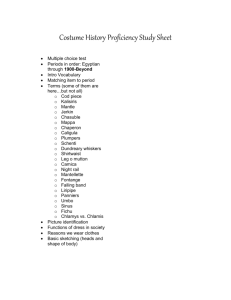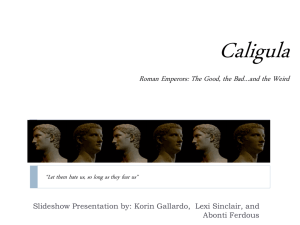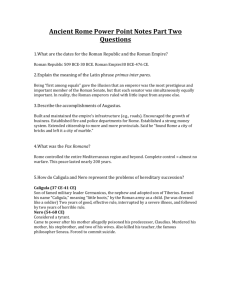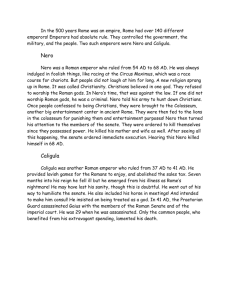File - Nicholas Lanza
advertisement
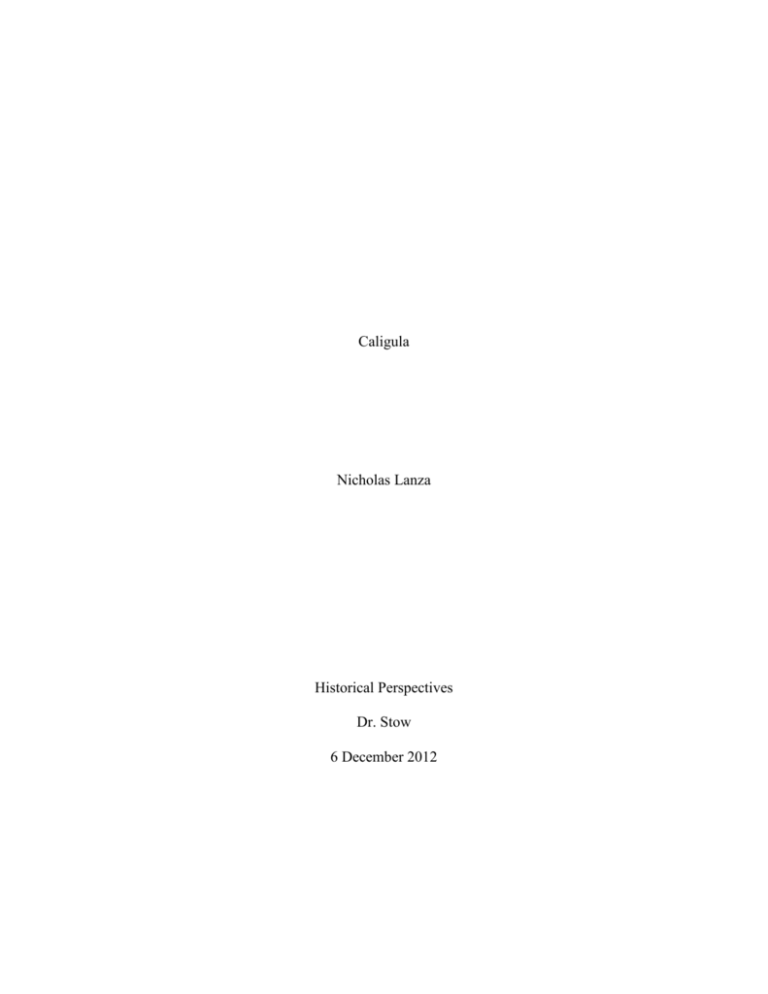
Caligula Nicholas Lanza Historical Perspectives Dr. Stow 6 December 2012 Lanza 2 Gaius Julius Caesar Augustus Germanicus, better known by his nickname, Caligula, was perhaps the most infamous emperor in Roman history. The general consensus of historians is that Caligula was an irrational madman who behaved erratically, especially for someone who claimed the title of emperor. However, few historians such as Aloys Winterling and Anthony Barrett argued that Caligula was not insane at all and each of his infamous acts of alleged insanity were actually justified with a coherent reason. Caligula was not insane, but he was a capricious, cruel and overly-ostentatious megalomaniac that Rome would’ve been better without. Caligula’s personality as emperor was vastly different than those of his predecessors. For one thing, he was much more cruel and cynical as displayed by his sense of humor. This behavior may be responsible for people viewing him as unstable in many instances. For example, it was reported that “he once broke out in a fit of laughter at a banquet, and when the consuls reclining next to him asked what was so humorous, he said that it had just occurred to him that he could remove their heads with a single nod.”1 Caligula had a hostile relationship with the senate for most of his reign because he couldn’t trust them due to numerous conspiracies that arose. He would often insult and embarrass members of the senate. One aspect of Caligula’s character that is often overlooked by many who have heard of him was his intelligence. Historian Josephus reported that “he was, moreover, a first-rate orator, deeply versed in the Greek and Latin languages.”2 Caligula’s skill as an orator would prove invaluable when addressing the senate early in his reign, but it would also be abused and misused to embarrass that same senate. His intelligence is also what led him to power since he was not directly in line with the succession of Tiberius. He was able to work his way into Tiberius’ will along with Gemellus. Lanza 3 The first seven years of Caligula’s life were spent travelling the Roman world with his family. He was the son of Aggripina, granddaughter of Augustus, and Germanicus, adopted son of the then current emperor, Tiberius, and a popular general who led campaigns against the Germans. Because of Germanicus’ popularity, Caligula became very popular by association, which was especially prevalent in his early reign as emperor. It was on his father’s military camp on the Rhine where Caligula earned his nickname which means “little boots” after the miniature military uniform he wore as a child. He also had several siblings travelling along with him who would make an impact on his life later on. The traveling of the Roman world only lasted seven years because on the 10th of October of the year 19, Germanicus died. Before he died, he accused Gnaeus Calpurnius Piso, the governor of Syria, of poisoning him. Eventually it was assumed that Tiberius actually ordered the poisoning of Germanicus because he became a threat due to his popularity with soldiers and commoners alike. This greatly affected the popularity of Tiberius, creating feelings of distrust and fear in Rome. Meanwhile Caligula and his sisters were sent to live with his great grandmother and following her death, their grandmother. They lived under constant observation of Tiberius’ soldiers. Tiberius’ Praetorian Guard prefect, Sejanus, was responsible for the downfall of Caligula’s remaining family. Sejanus was completely trusted by Tiberius, until Sejanus became power hungry and his plotting against the emperor been publicly addressed in the senate, resulting in the execution of him and his family in 31 AD. However, before that, he attempted to sway the succession issue in his favor by eliminating his competition. First he had Tiberius’ only biological son, Drusus II, killed. The next targets were members of the emperor’s adopted son’s family. Sejanus arrested and exiled Agrippina and Nero, Caligula’s eldest brother, in the year 29 Lanza 4 and did the same to Drusus III, Caligula’s other brother, a year later. All three of them perished in exile and all the blame could be put onto Tiberius. Caligula was relocated to Capri in 31 AD, which is where Tiberius was headquartered at the time. This was a wise move on Tiberius’ part as by doing this he could keep a watchful eye over the boy whose family was recently imprisoned. Nero died in 30 AD, and Agrippina and Drusus died in 33 AD, while Caligula was residing in Capri. Tiberius could thus gauge Caligula’s reaction and prevent him from formulating any sort of plot for revenge. However, Caligula’s reaction was that of indifference which indicated to Tiberius that Caligula was not a threat. Historian Tacitus criticized Caligula on this reaction by reporting Caligula’s “monstrous character was masked by a hypocritical modesty: Not a word escaped him at the sentencing of his mother or the destruction of his brothers; whatever the mood assumed for by the day by Tiberius, the attitude of his grandson was the same, and his words not greatly different.”3 How was Caligula supposed to react in the situation he was in? He couldn’t express his true feelings of anguish since the emperor was watching his every move. Tiberius died on March 26th in the year 37 AD which caused Caligula to become the new emperor with backing from the Praetorian Guard prefect, Macro. Macro favored Caligula once he began his stay at Capri and was credited by Philo with saving Caligula’s life safe from Tiberius. Along with Macro, Marcus Silanus, the highest ranked senator of the time, guided the emperor during his early reign. The senatorial class was surprised by Caligula’s political prowess given his lack of political background. The guiding of Macro and Silanus, the approval of the senate combined with his popularity among the people allowed Caligula to actually be a suitable emperor for a time. Lanza 5 The early reign of Caligula was a relatively good one. The people of Rome were fed up with Tiberius and welcomed Caligula as a breath of fresh air. He still retained the popularity he inherited from his father which was also bolstered by the demise of his family. The first few significant acts as emperor were distributing a sum of 45 million sesterces among the Praetorian Guard and plebs, restoring democratic elections, adopting his rival Gemellus and renouncing honors for himself given by to him by the public. These among other actions were “clearly seen as an attempt to copy the Augustan Principate-a development that his contemporaries in the aristocracy no doubt registered with satisfaction.”4 Caligula initially seemed to be a rational and beneficial emperor, but that all changed when his illness struck. October 37th can be seen as a turning point in the reign of Caligula. During this time Caligula fell ill. No one was exactly sure what the illness was, but whatever it was, it caused a change in Caligula. Once he recovered, one of his first actions was to eliminate Gemellus under the claims that he had hoped for the emperor’s death so he may inherit the throne. The two men responsible for the emperor’s early success, Macro and Silanus, were also denounced and eliminated on conspiracy charges. Numerous members of the senatorial class were also condemned. A significant controversial act of Caligula’s was the serving of food covered in gold leaf and the consumption of pearls dissolved in vinegar. These were often condemned as senseless wastes, but there was actually a cogent reason behind them. As Tacitus said: “The more handsome the fortune, the palace, the establishment of a man, the more imposing his reputation and his clientele.”5 This was just Caligula’s method of joining in the aristocratic competition of determining who was the most luxurious. Squandering massive sums of wealth was nothing new Lanza 6 to the aristocratic class. For instance, the pearls dissolved in vinegar had actually been done before by Cleopatra in a wager with Marcus Antonius.6 There was another instance where Caligula wanted to declare his favorite race horse as a Consul. This claim has been taken out of context by many as a way to portray him as insane. In reality, this act was most likely a joke played on the senators. Consulship was the goal of many ambitious aristocrats, and by giving the position to a horse, he was ridiculing the senators and their quest for power. Another reason for this was to demonstrate that Caligula could make anyone he wanted into a consul, showing the senators that all their attempts to appeal to him were essentially useless. Caligula abandoned his conquest of Germania and instead travelled to northern Gaul where perhaps the greatest action that made everyone question his mental state took place. He planned to invade cross the English Channel and invade Britain, but instead he ordered his legions to assemble in battle formation only to collect seashells. Afterwards it was reported that Caligula intended to completely destroy the two legions present and then after realizing how dangerous that was, he only wanted to decimate them. The two of these actions hinted at a mutiny taking place. Three years later in 43 AD Claudius attempted to invade Britain again, but his legions mutinied and refused to cross the English Channel. It took several weeks for Claudius to convince them. Caligula ordering his troops to collect seashells can be interoperated as Caligula ridiculing, something Caligula was very good at, the cowardice of his soldiers. Since they refused to go into battle, Caligula gave them the mundane task of seashell collecting, a task definitely not suitable for soldiers. Ordering the decimation of the legions was taking his malice a bit further. Lanza 7 Once Caligula returned back south to Italy he wanted to hold an elaborate ceremony to signify his successes in Germany.7 However Caligula had “forbidden the Senate to perform any formal welcome and other honors, so that a triumphal procession of the usual kind was out of the question.”8 So he, being the eccentric man he was, decided that he would build a floating bridge over three miles long on the Bay of Baiae, cross it dressed as Alexander the Great, and storm the town of Pueotoli once he reached the other side as if he was conquering it. Dio claimed that this was Caligula showing his disdain for a triumph, which adds up given his relationship with the senate who holds the triumphs. Caligula was supposed to have bragged about his accomplishment of crossing the Bay and mocked the Persian rulers Darius and Xerxes who constructed a similar bridge centuries earlier, but covered a smaller area. It was instances like these which exemplify his lavishness and make his actions in public unsurprising. The emperor loved the gladiatorial games and theater. He often acted much more arrogant at these events when compared to how he was involved with politics. For example, when he attended a theatrical performance, he would become upset when the audience did not cheer along with him for performances he liked, or applauded at performances he did not like. He became “so carried away by his interest in singing and dancing that even at the public performances he could not refrain from singing with the tragic actor as he delivered his lines, or from openly imitating his gestures by ways of praise or correction.”9 He was also reported to have trained with gladiators a few times while using real weapons. It was also claimed that Caligula opened a brothel on Palatine Hill consisting of married women and young children. What he constructed was not actually a brothel at all. The occupants of the mentioned building were the wives and children of the most aristocratic families. This was a strategic move on Caligula’s part because now the families of the senators were all under his Lanza 8 immediate jurisdiction meaning if at any time he wanted to eliminate the family of a senator, he was perfectly capable. He demanded payment from the senators in order to ensure their families safety. This was a way to keep senators in check, deter them from devising new conspiracies and collect a profit. The allegations regarding incest with any of his three sisters should be looked on with skepticism. “Neither Seneca nor Philo, contemporaries of Caligula who both adopt a highly moral tone, make any mention of incest”10 (Barrett, 85). It was likely that the incest rumors were concocted by the highly critical Suetonius. Caligula did have a close relationship with his sisters, Drusilla being the favorite one among them. In fact once she died, Caligula had her deified and granted her honors. This deification was also highly criticized as mad, when it was actually not all that uncommon. “What is striking is that they were granted to a person of such little political significance. But this in itself does not indicate that Caligula was deranged… any more than, say, Queen Victoria in erecting grandiose statues for Albert.”11 The final major incident of Caligula’s alleged insanity was the effort to relocate the capitol of the empire to Alexandria. It actually wasn’t a very illogical decision at all. Julius Caesar stayed in Alexandria for a time and rumors started circulating that he intended to declare the city the permanent capitol. Augustus Caesar included the province of Egypt in his dominationis arcana.12 Tiberius ruled the empire from an island miles away from Rome. Tacitus explained at the time Alexandria was the source of the Italian grain supply so it would be easy to starve Italy, if there was ever a need. Tacitus also reported that Egypt’s strategic location made it gave it a prime defensive position capable of defending from armies of any magnitude. If Tiberius was capable of ruling for 12 years without stepping foot in Rome, why could Caligula not rule from Alexandria? Lanza 9 Caligula was assassinated before he could reach Alexandria in January of the year 41 by Cassius Chaerea with aid from two tribunes of Praetorians and other aristocratic conspirators. It was only a matter of time before this happened; the two failed conspiracies in the past only signified that more attempts would happen. The senators were tired of Caligula’s constant abuse, especially Chaerea. He did a lot of Caligula’s dirty work such as tax collection and demanding late payments which no doubt affected his popularity appropriately. Caligula would often make jokes at his expense, specifically attacking his cowardice from his failure to live up to the emperor’s expectations completing tasks. Josephus portrayed Chaerea as a heroic figure who would give his life in return for bringing about the old days prior to Caligula’s tyranny. The murder took place before he left for Alexandria during gladiatorial games near his palace. He was watching the games surrounded by the most prominent members of the senate, but decided to return to his palace for some relaxation. He was accompanied by his retinue, but they were distracted by a number of the conspirators from closely following Caligula, allowing him to become isolated. He entered a room of Greek boys who were practicing to perform in his honor which is when Chaerea managed to assassinate him. The tyrannical, but not insane, reign of Caligula had come to an end. Immediately following his death, the senate conjured up the idea of returning Rome to republic, but that idea was rapidly dismissed since Caligula’s uncle Claudius had been named emperor by the Praetorian Guard in a matter of only a few hours. Claudius persecuted a number of conspirators, including Chaerea who was executed. Chaerea had counted on the Praetorian Guards switching loyalties over to him since he had a few of its member among his ranks. Despite that, the Guards remained loyal to the emperor which caused his demise. Lanza 10 As for all the executions and convictions which some claimed were whimsical decisions, they were actually in retaliation for conspiracies against Caligula. He was only attempting to secure his reign through any means necessary, that meant eliminating any possibility of an assassination happening. Many convictions were based on denunciations from other members of the senatorial class, which could’ve been baseless, but Caligula didn’t take any chances. There were three conspiracies against Caligula during his life, two of which he avoided and issued punishments for. It can be said that most of Caligula’s actions which made others view him as insane were actually intentionally done to embarrass the senate. He reigned for four years with the senate promptly obeying his orders and adhering to his every “crazy” command. “He had held up a mirror to the Roman aristocracy and showed them the absurdity of their own behavior.”13 That being said, the insane one in this situation would not be the Emperor himself, but rather the underling who followed his every command. Caligula was not mentally ill; he was only a whimsical egoist who became drunk with power. A lot of Caligula’s actions perceived as insane were taken out of context by many historians in order to demean him. However just because he wasn’t insane doesn’t mean he was a suitable emperor. The reign of Caligula saw no new territories added and no mentionable progress in the flourishing of the empire. He was arguably one of the worst emperors of the Roman Empire for reasons other than his insanity. Lanza 11 End Notes 1. Ferrill, Arther. Caligula Emperor of Rome. (New York: Thames and Hudson Inc., 1991), 155. 2. Winterling, Aloys. Caligula. (Los Angelos, CA: University of California Press, 2011), 43. 3. Tacitus, The Annals. 6.20.1, http://classics.mit.edu/Tacitus/annals.html. 4. Winterling. Caligula, 59. 5. Tac. Ann. 3.55.1-2. 6. Marcus Antonius bet Cleopatra that she could not spend ten million sesterces on a single meal. Dissolving pearls in vinegar is how she won the bet. 7. There were actually no major military victories in Germania, or in any region during Caligula’s reign. However if there was no celebration of some kind for his return, Caligula thought people would interpret that as admitting defeat. 8. Winterling. Caligula, 127. 9. Suetonius. The Twelve Caesars, Life of Caligula. 54.1, http://penelope.uchicago.edu/Thayer/E/ Roman/Texts/Suetonius/12Caesars/Caligula*.html. 10. Barrett, Anthony. Caligula: The Corruption of Power. (Yale University Press, 1989), 85. 11. Ibid., 86. 12. According to Tacitus, one of his “secret principles of domination.” 13. Winterling. Caligula, 188. Lanza 12 Bibliography Barrett, Anthony. Caligula: The Corruption of Power. Yale University Press, 1989. Ferrill, Arther. Caligula Emperor of Rome. New York: Thames and Hudson Inc., 1991. Suetonius. The Twelve Caesars, Life of Caligula. http://penelope.uchicago.edu/Thayer/E/Roman /Texts/Suetonius/12Caesars/Caligula*.html. Tacitus, The Annals. http://classics.mit.edu/Tacitus/annals.html. Winterling, Aloys. Caligula. Los Angelos, CA: University of California Press, 2011.
